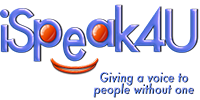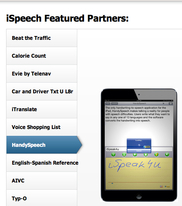Partners & Links

Founded in 1817, the American School for the Deaf was the first permanent school for the deaf in the United States and a nationally renowned leader in providing comprehensive educational, programs and services for deaf and hard-of-hearing students.
"This is what was needed for our group members and many others who have problems with speaking. It will make a big difference for us as we have been so frustrated. We can't believe - it's a God send"
"I want to thank Eric and the family for coming out to speak to the group - it was most uplifting just to know that there is help out there for us. I want to thank you for all the kind words ..."
"I want to thank Eric and the family for coming out to speak to the group - it was most uplifting just to know that there is help out there for us. I want to thank you for all the kind words ..."
|
The Connecticut Tech Act Project's mission is to increase independence and improve the lives of individuals with disabilities through increased access to Assistive Technology (AT) for work, school and community living. We offer a variety of programs and services to help people with disabilities get the AT they need. Visit us at www.CTtechact.com
|
The Eastern Connecticut Assistive Technology Center (ECAT) is a Connecticut Tech Act Project partner and houses a variety of AT equipment and devices that focus on reducing barriers and increasing function for individuals with disabilities. We have technology for those who have disabilities affecting: cognition, hearing, mobility and vision The equipment can be used in the workplace, home, community and school. Employers are encouraged to contact and visit ECAT to find out how they may be able to accommodate any employee with a disability. We offer trials, demonstrations and technology training free of charge.
Contact: Jennifer Lortie at [email protected] 860-423-4534 x 319
Contact: Jennifer Lortie at [email protected] 860-423-4534 x 319
|
Stroke-Network.com
Stroke-Network gives you pertinent, practical and useful information provided by top experts in stroke recovery and rehabilitation. |
HandySpeech App Helps Stroke Survivors Communicate
Communication disorders affect every stroke survivor differently. Persons with aphasia may have difficulty verbally forming sentences, or pronouncing the words they intend to say. For stroke survivors that have retained the ability to write, but cannot orally form speech proficiently, there is a new mobile app that can help.
Communication disorders affect every stroke survivor differently. Persons with aphasia may have difficulty verbally forming sentences, or pronouncing the words they intend to say. For stroke survivors that have retained the ability to write, but cannot orally form speech proficiently, there is a new mobile app that can help.
|
"We're excited to have the opportunity to support such a young developer with a great cause," says iSpeech CEO Heath Ahrens. "This is an inspiration to our entire developer community."
|
|
|













